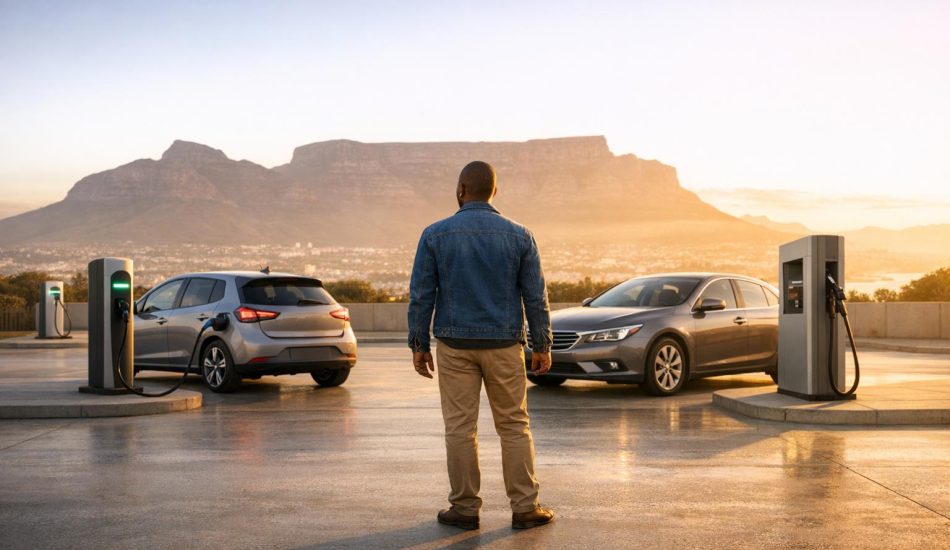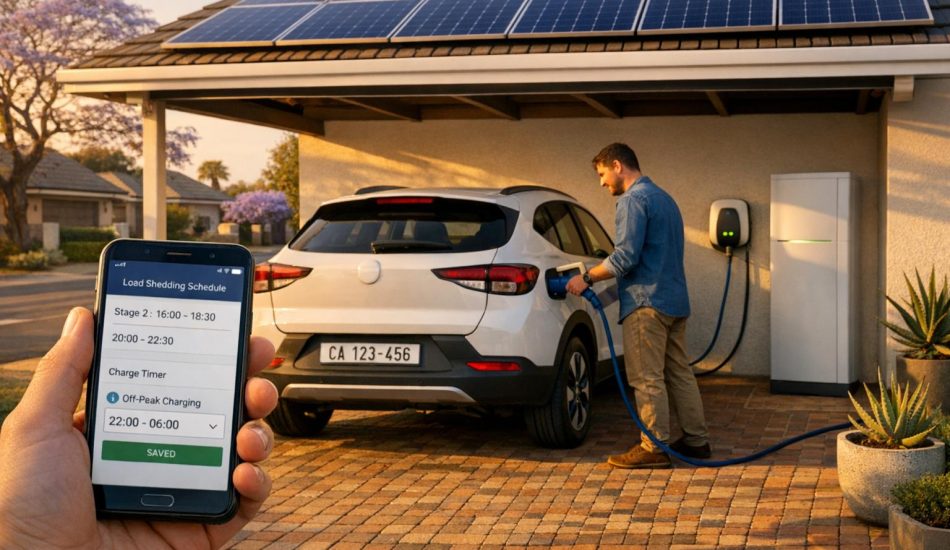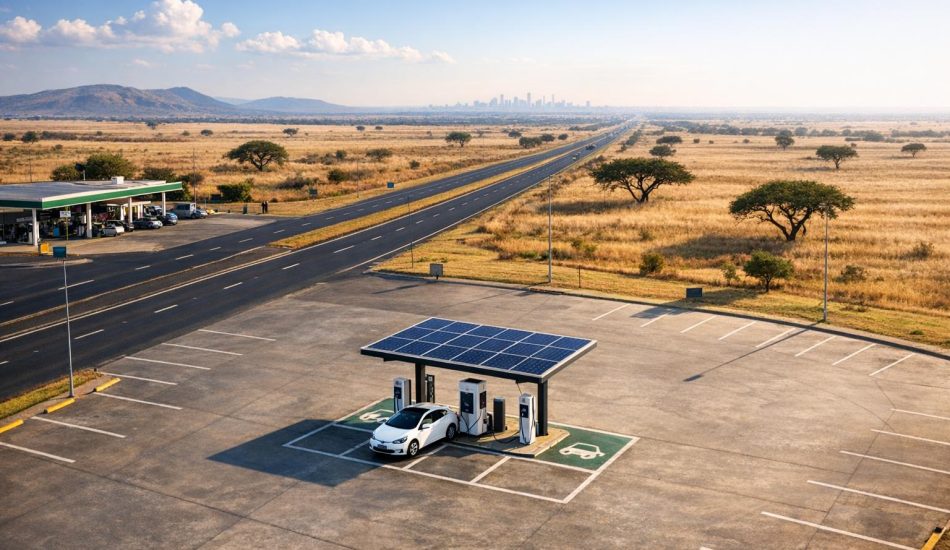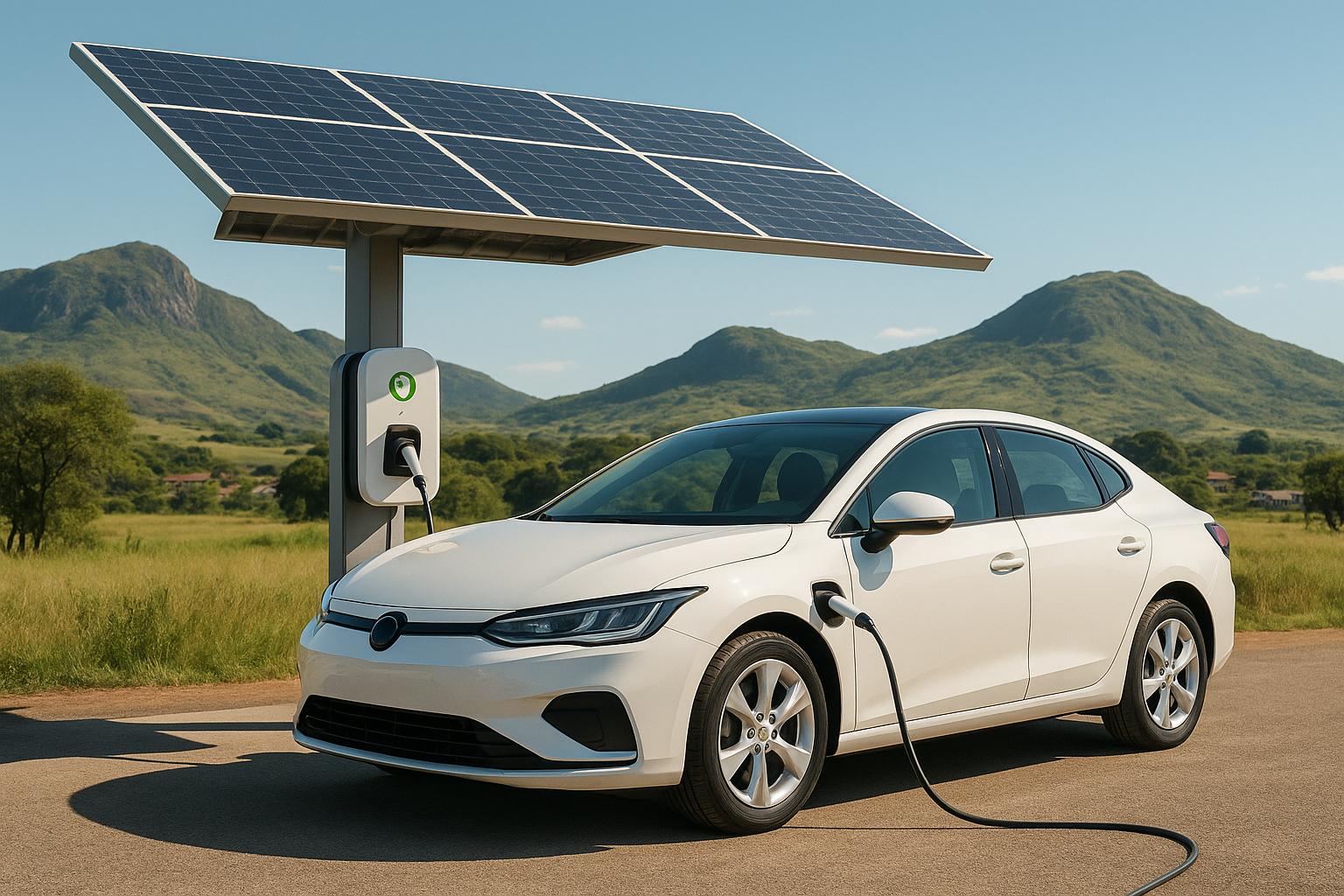
Electric vehicles (EVs) are becoming more accessible in Malawi, thanks to new tax breaks, affordable models, and growing renewable energy infrastructure. Here’s what you need to know:
- Lower prices: Import duties are waived, VAT is reduced to 8%, and excise tax on low-power EVs is eliminated, cutting costs by 30–40%.
- Affordable options: Models like the BYD Seagull ($13,500) and Shineray T3ev ($14,000) cater to budget-conscious buyers, while premium options like Tesla Model Y ($37,800) offer advanced features.
- Renewable energy support: Over 80% of Malawi’s electricity comes from hydro and solar power, reducing EV running costs to $1.77 per 100 km.
- Charging infrastructure: Urban areas like Lilongwe and Blantyre now have charging stations, with plans to expand further.
- Easy purchasing: Platforms like EV24.africa simplify the buying and import process, offering financing options with down payments as low as 30%.
Whether you’re looking to save on fuel costs or reduce reliance on imported petroleum, EVs are now a practical choice in Malawi.
Top Electric Car Models Available in Malawi in 2025
Popular Electric Car Brands and Models
Malawi’s electric vehicle (EV) market in 2025 offers a variety of options to suit different budgets and preferences. Chinese manufacturers dominate the affordable segment, while global automakers cater to buyers seeking high-end features and performance.
BYD has made a strong impression with two standout models. The BYD Seagull is a budget-friendly choice for cost-conscious buyers, while the BYD Seal offers advanced technology, including Blade Battery technology, for those willing to invest in a premium experience.
Geely’s Rd6 EV is designed as a practical mid-range family vehicle, perfect for everyday use. Meanwhile, DongFeng introduces the Aeolus and the compact Nano 01, which appeal to urban drivers looking for an affordable entry into the EV market.
Shineray provides economical options with its T3ev, available in both standard and upgraded versions. For compact sedan enthusiasts, Changan’s Yidong delivers modern features at a competitive price. In the premium category, Toyota‘s BZ4X offers multiple trims, and Tesla brings its Model Y (duty not paid), showcasing cutting-edge technology and performance.
To further clarify these options, the table below compares their prices, highlighting the range of choices available for Malawian consumers.
Specifications and Price Comparison
Here’s a quick look at the price points for some of the most popular EVs in Malawi in 2025:
| Model | Price (USD) |
|---|---|
| BYD Seagull | $13,500 |
| Shineray T3ev | $14,000 |
| Shineray T3ev (Rev) | $17,000 |
| Changan Yidong | $21,000 |
| Toyota BZ4X XLE | $25,000 |
| DongFeng Aeolus | $28,000 |
| Toyota BZ4X Limited | $28,500 |
| Geely Rd6 EV | $35,000 |
| Tesla Model Y | $37,800 |
| BYD Seal | $64,550 |
This breakdown highlights distinct market segments. Models priced under $15,000 provide affordable mobility solutions, while those between $20,000 and $30,000 are ideal for families. Premium models above $30,000 focus on advanced technology and superior performance.
Features for Malawian Drivers
For drivers in Malawi, certain features are especially important given the local infrastructure and driving conditions. One key factor is range – vehicles should offer at least 155 miles (250 km) on a single charge to comfortably handle rural travel. Additionally, compatibility with Type 2 or CCS charging ports is crucial for Malawi’s developing charging network.
Seating capacity and interior space also play a big role, particularly for families making the switch to electric vehicles. Beyond these practical considerations, the economic benefits of EVs are becoming increasingly evident. Lower electricity costs, paired with Malawi’s reliance on renewable energy sources, make EV ownership an appealing option for drivers across all market segments.
2025 Electric Car Pricing and Cost Factors in Malawi
EV Cost Breakdown in Malawi
Understanding the breakdown of electric vehicle (EV) costs is essential for planning your purchase. The total price goes beyond just the base cost of the car. It includes delivery fees, registration, insurance, and optional add-ons like accessories or extended warranties.
In Malawi, EV prices vary widely depending on the segment. Entry-level models are designed for buyers on a tighter budget, while mid-range and premium options pack in advanced features and higher performance. For detailed comparisons, you can check out EV24.africa, where pricing information is readily available.
Delivery fees are calculated based on your location and shipping method. These charges, updated in real time, are transparently displayed on EV24.africa, ensuring no surprises during the buying process.
Tax Incentives and Government Support
Malawi’s 2025 electric vehicle policy marks a big step forward in promoting clean transportation. The government has introduced a revamped tax framework aimed at making EVs more affordable. Here’s what’s changed:
- Import duties on fully electric vehicles have been completely waived.
- Value Added Tax (VAT) has been reduced from 16.5% to 8%.
- Excise tax on EVs under 100 kW has been eliminated.
These changes translate to a cost reduction of 30–40% compared to previous rates. Here’s a quick overview of the updated tax structure:
| Tax Type | Previous Rate | 2025 EV Rate |
|---|---|---|
| Import Duty | 25% | 0% |
| Excise Tax | 10% | 0% |
| VAT | 16.5% | 8% |
Other perks include priority clearance at ports for EV imports and the removal of age limits on imported electric vehicles. This is a notable difference from traditional combustion vehicles, which are typically restricted to a 10-year import age. These updates simplify the import process and offer buyers a wider range of EV options.
Financing Options Through EV24.africa
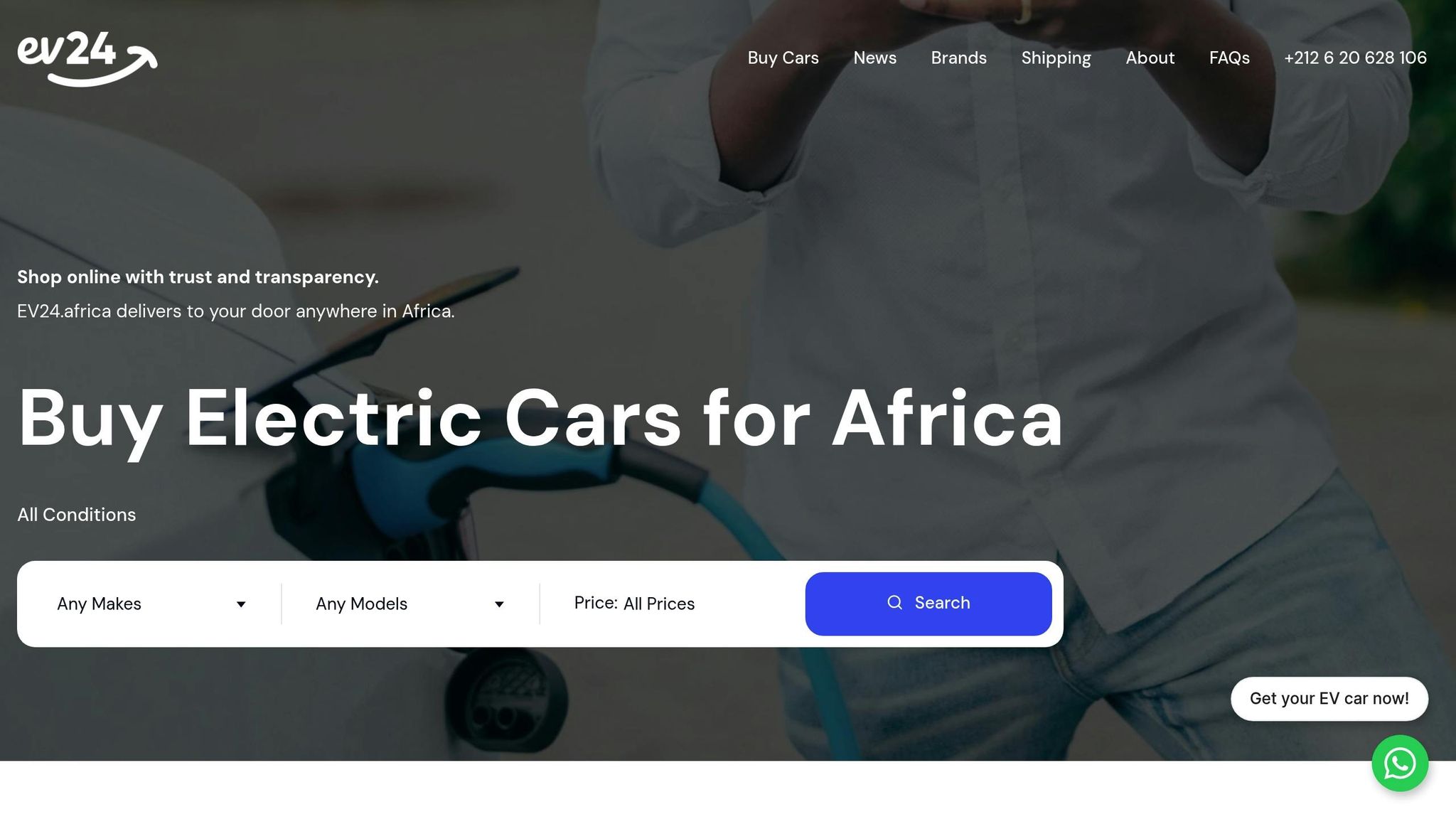
To make EV ownership even more accessible, EV24.africa has teamed up with local banks to provide flexible financing options. Buyers can secure financing with down payments as low as 30% of the vehicle’s price. The platform integrates financing details directly into the car selection process, showing monthly payment estimates alongside vehicle specifications.
Loan terms and interest rates depend on the chosen bank and the buyer’s credit profile, but EV24.africa’s partnerships ensure competitive terms for those who qualify. Additionally, with over 80% of Malawi’s electricity coming from hydro and solar power, the operational costs of EVs are considerably lower than those of traditional fuel-powered cars.
These tax incentives, financing plans, and low running costs make the transition to EV ownership more practical and appealing, especially as Malawi continues to expand its charging and service infrastructure.
How to Buy and Import an Electric Car to Malawi in 2025
Step-by-Step Buying Process on EV24.africa
Start by creating an account on EV24.africa. Enter your details and location to get accurate estimates for shipping and taxes. Use the platform’s filters to browse available electric vehicles (EVs) by brand, price, and battery capacity. When choosing a car, focus on models with a minimum range of 250 km, 100% electric drive, and charging ports compatible with Malawi’s infrastructure (Type 2 or CCS). Don’t forget to check the battery’s health status before making your decision.
EV24.africa provides a transparent cost breakdown, covering the car’s price, shipping fees, and estimated taxes. Financing options are also available for those who need them. Once you’ve selected your vehicle, complete the purchase by making a payment using one of the accepted methods. After that, EV24.africa takes care of the entire import process for you.
Import and Delivery Process
Once your purchase is confirmed, EV24.africa handles all logistics. This includes sourcing the EV, conducting compliance checks, and preparing customs documentation. Before shipping, your car undergoes a pre-inspection to ensure it matches your order specifications. Key documents like the certificate of origin, bill of lading, and compliance certificates are prepared by the platform. EV24.africa also ensures you benefit from Malawi’s tax incentives by managing all compliance requirements.
When your vehicle reaches the port, EV24.africa’s local partners take over customs clearance. You may need to provide identification and proof of payment for any outstanding fees. Throughout this process, the platform’s tracking system keeps you updated on your car’s status.
Shipping options include:
- RoRo (Roll-on/Roll-off): A quicker and more affordable option for operational vehicles.
- Container shipping: Offers better protection for non-operational vehicles or multiple-car shipments.
Delivery Timelines and Expectations
Electric vehicles are typically delivered within 4–8 weeks:
- 1–2 weeks for preparation and paperwork
- 2–4 weeks for shipping
- 1–2 weeks for customs clearance
You’ll receive real-time tracking updates via email and SMS. For delivery, you can choose between port-to-port service, where you collect the car from a major port, or door-to-door delivery, which brings the EV directly to your address.
For detailed pricing and tax estimates specific to Malawi – including import duties and logistics fees – reach out to EV24.africa’s customer service team. They’ll provide a tailored breakdown based on your location and vehicle choice.
Electric Vehicle Infrastructure and Ownership in Malawi
Charging Infrastructure in Malawi
Malawi is steadily building its electric vehicle (EV) charging network to keep up with the rising demand. By 2031, the government plans to install ten EV charging stations in key urban areas and along major highways. These stations will be strategically located in Lilongwe, Blantyre, Zomba, and Mzuzu, as well as on the main highway connecting Blantyre to Mzuzu.
"We are working together with Electricity Supply Corporation of Malawi (ESCOM), Malawi Energy Regulatory Authority (MERA), Ministry of Transport and Public Works, and private investors to facilitate agreements and licensing for public charging station operators, allocate public land for charging station development, and ensure transparency for potential investors", – Justin Theu, spokesperson for the Ministry of Energy
The selected locations already have power systems capable of handling the additional energy demands of EV charging without requiring major upgrades. At present, charging stations are operational in Lilongwe City Centre, Blantyre CBD, Mzuzu Mall, and select TotalEnergies fuel stations. For those charging at home, most EVs can be powered using a standard 3-pin plug, making it a practical option for daily use. Meanwhile, Carway Autos is working on expanding the network by collaborating with shopping centers, petrol stations, and local authorities to establish more charging points.
Safety is also a top priority as the infrastructure grows. Fitina Khonje, Consumer Affairs and Public Relations Manager for MERA, emphasized the importance of regulations and inspections:
"There will be safety inspections of the EV charging stations that have already been installed, and as a regulator, we have taken good strides to ensure that relevant regulations are in place"
This developing network not only supports the everyday needs of EV drivers but also lays a solid foundation for the long-term growth of electric vehicle adoption in Malawi.
Maintenance and Warranty Considerations
One of the standout advantages of EVs is their reduced maintenance costs – about a third of what traditional combustion vehicles require. This cost reduction comes from the simplicity of EV design, which eliminates the need for oil changes, cooling system flushes, spark plug replacements, and other routine services associated with gas-powered cars.
Routine maintenance for EVs typically involves tasks like tire checks, rotations, cabin air filter replacements, and windshield wiper blade changes. Inspections of brakes, steering, suspension, and chassis components are also recommended. Thanks to regenerative braking technology, EV brake systems last longer than those in traditional vehicles. Additionally, most EV batteries come with an 8-year/100,000-mile warranty, providing peace of mind for buyers. For those purchasing used EVs through EV24.africa, battery health reports are included to ensure transparency about the vehicle’s condition.
To support the safe servicing of EVs, the Malawi Bureau of Standards, in partnership with MERA, has updated the Malawi Wiring and Installation Standard. This ensures that technicians and service centers can handle EVs safely and in line with global standards.
Pros and Cons of EV Ownership in Malawi
Owning an EV in Malawi comes with a mix of benefits and challenges, as outlined below:
| Advantages | Challenges |
|---|---|
| Freedom from fuel shortages – Reduces reliance on imported fuel | High upfront costs – The initial purchase price can be a significant hurdle |
| Energy independence – Home charging is possible, especially with renewable energy | Limited charging infrastructure – Primarily concentrated in major cities |
| Significant cost savings – Driving an EV costs about one-eighth per kilometer compared to gas-powered vehicles | Public perception concerns – Often tied to fears about power supply reliability |
| Lower maintenance costs – Around one-third of the upkeep expenses of traditional cars | |
| Tax incentives – New policies can reduce import costs by 30–40% compared to 2024 rates | |
| Environmental benefits – Supported by a grid that relies on over 80% renewable energy |
Experts in the field suggest that EVs should be promoted not just as practical vehicles but as symbols of independence, financial empowerment, and forward-thinking innovation.
sbb-itb-99e19e3
Electric Vehicles Hit the Roads in Malawi | VOANews
Making the Shift to Electric Mobility in Malawi
Malawi is stepping into a new era of transportation, where electric vehicles (EVs) present opportunities for energy independence, cost savings, and cleaner mobility. With over 80% of the country’s electricity coming from hydro and solar sources, Malawi is uniquely equipped to embrace a greener transportation future powered by renewable energy.
The cost advantage of EVs is striking. Driving an EV costs just $1.77 per 100 kilometers, compared to $7.20 for gasoline-powered vehicles. For someone driving 15,000 kilometers a year, that’s a savings of $814.50 annually. For higher-mileage drivers covering around 70,000 kilometers, the savings jump to approximately $3,801.00. These figures are especially impactful in a country like Malawi, where fuel shortages and reliance on imported petroleum are ongoing challenges.
Government policies have also made EV ownership more accessible. Streamlined import regulations and services like EV24.africa simplify the buying process by managing everything from sourcing and logistics to compliance and delivery. On average, the entire import process now takes just 4 to 6 weeks. This regulatory support not only reduces barriers for individual buyers but also strengthens Malawi’s energy resilience.
"Importing an electric vehicle into Malawi in 2025 has never been easier or more cost-effective. Malawians can now enjoy cleaner, smarter, and more affordable mobility."
The benefits of EV adoption go beyond personal savings. By reducing reliance on imported fuel and vehicles, Malawi can alleviate pressure on foreign exchange reserves. Additionally, the shift supports the growth of renewable energy infrastructure, creating a sustainable cycle where clean electricity fuels clean transportation.
Temwanani Mweso, a Renewable Energy Regulation Specialist at MERA, highlights the broader impact: "They offer a cleaner, more sustainable transportation option for Malawi’s future." With charging stations expanding in major cities like Lilongwe, Blantyre, and Mzuzu, and financing options becoming more accessible, owning an EV in Malawi has never been more achievable.
FAQs
What are the advantages of choosing an electric car in Malawi over a gasoline-powered car?
Switching to an electric vehicle (EV) in Malawi offers plenty of perks. One of the biggest advantages? Lower running costs. Charging an EV is far cheaper than filling up a gas tank, and because EVs have fewer moving parts, they generally need less maintenance. That means fewer trips to the mechanic and more money in your pocket.
EVs also make a real difference when it comes to reducing air pollution and cutting greenhouse gas emissions. This shift helps create cleaner air and a healthier environment for everyone.
On top of that, EVs can reduce Malawi’s dependence on imported fuel. By using locally generated electricity instead of foreign fuel, the country can save valuable foreign currency and boost energy independence. Plus, EVs tend to last longer, making them a smart, durable choice over time. So, when you switch to an EV, you’re not just saving on costs – you’re contributing to a cleaner, greener future.
How do tax incentives in Malawi make electric vehicles more affordable in 2025?
Malawi’s 2025 Tax Incentives for Electric Vehicles
Starting in 2025, Malawi is introducing tax incentives that make owning an electric vehicle (EV) much more affordable. These include:
- A 25% reduction in import duties
- A lowered 8% VAT, compared to the usual 16.5%
- Zero excise tax for EVs with power ratings under 100 kW
These combined measures could slash the cost of an EV by 30–40%, significantly easing the financial barrier for potential buyers. Beyond saving money, this initiative is designed to promote the shift toward cleaner, electric transportation throughout the country.
What factors should I consider when choosing the right electric car for Malawi in 2025?
Choosing the Right Electric Vehicle in Malawi
When picking an electric vehicle (EV) in Malawi, it’s crucial to go for a model that matches the local terrain and available charging infrastructure. For instance, compact and dependable models like the Nissan Leaf or Hyundai Kona EV work well for both city streets and rural roads. If you’re planning longer trips, a long-range EV like the Lucid Air, which offers up to 512 miles per charge, could be a great option – especially as the country’s charging network continues to develop.
Don’t overlook government incentives, such as reduced import duties and VAT, which can make owning an EV much more affordable. Also, check that the EV you choose is compatible with Malawi’s charging standards and that local maintenance services and spare parts are readily available. Keeping these factors in mind will help ensure a smooth and practical shift to electric mobility.


